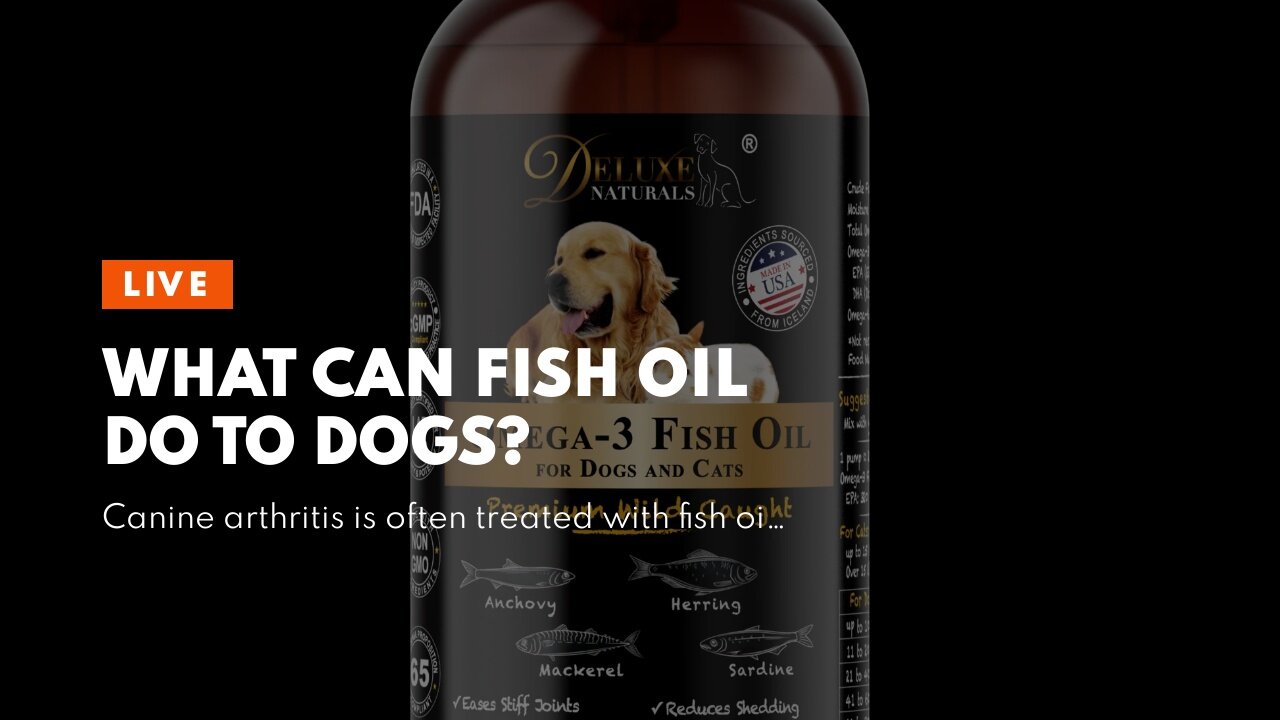Premium Only Content

What can fish oil do to dogs?
What can fish oil do to dogs?
Canine arthritis is often treated with fish oil by veterinarians. Because fish oil is an anti-inflammatory natural remedy that can provide pain relief for painful joints, it’s often recommended by veterinarians. The Journal of the American Veterinary Association published a study that found arthritis dogs had a significantly higher ability to get up from a sitting position to play and to stand at six weeks (of supplementation), and a better ability to walk at 12 to 24 weeks. The fish oil must be given time to work. Clinical improvement can take up to a few months. Benefits of fish oil...
Canine arthritis is often treated with fish oil by veterinarians. Because fish oil is an anti-inflammatory natural remedy that can provide pain relief for painful joints, it’s often recommended by veterinarians. The Journal of the American Veterinary Association published a study that found arthritis dogs had a significantly higher ability to get up from a sitting position to play and to stand at six weeks (of supplementation), and a better ability to walk at 12 to 24 weeks. The fish oil must be given time to work. Clinical improvement can take up to a few months. Benefits of fish oil for dogs A fish oil supplement may also be helpful in arthritis. skin disorders, like itchingkidney diseasehypertriglyceridemia (too much fat in the blood)cognitive dysfunction syndromecancer (appears to slow growth in some cancers)What’s In Fish Oil? Fish oil is typically derived from cold-water fish like salmon, sardine and anchovy. Fish oils are high in omega-3 fatty acid, namely, eicosapentaenoic (EPA) as well as docosahexaenoic (DHA). DHA and EPA can be anti-inflammatory and have benefits for the skin, heart, brain, kidneys, and joints. Dosages of fish oil for dogs Fish oil supplementation can be started at any age. However, it is best to discuss this with your veterinarian if your pet is still a puppy. For active and athletic dogs, it is best to start supplementing fish oil sooner than later. The combined EPA/DHA (omega-3 fatty acid) dosage recommended for a condition is dependent on its severity. It ranges from 70 to 310 mg per kilogram (mg/kg), which is 1 mg per 2.2 lbs of your dog’s bodyweight. According to the National Research Council (NRC), the safe upper limit is 370mg/kg. Fish oils can cause allergic reactions in some dogs, especially if the dog has a history of gastrointestinal and pancreatic diseases. Introduce fish oil slowly to your dog to ensure that they are comfortable with it. Oily diarrhea, vomiting and pancreatitis can all occur when a dog is given too much fish oil. Be sure to include the fat content of fish oil in your dog’s calorie budget if your dog is obese. You can ask your veterinarian for guidance if you are not sure how much fish oil your dog should receive. Fish Oil for Dogs The U.S. Food and Drug Administration does not regulate supplements such as fish oil. Make sure your dog gets fish oil only from a trusted source. This will ensure that the product is safe and free of contaminants such as heavy metals and polychlorinated biphenyls. We recommend you select a fish oil supplement with a National Animal Supplement Council seal. The NASC is an independent organization that monitors the quality of its members’ products and ensures they adhere to their high standards. What does fish oil do for dogs? Whole Dog Journal.
-
 UPCOMING
UPCOMING
LFA TV
7 hours agoWhy Do Migrant Criminals Love Obama So Much? | TRUMPET DAILY 1.24.25 7pm
1.54K -
 UPCOMING
UPCOMING
2 MIKES LIVE
45 minutes ago2 MIKES LIVE #171 Open Mike Friday!
10 -
 UPCOMING
UPCOMING
Quite Frankly
5 hours ago"Fugitives No More, JFK Declass, Stargate vs MAHA" ft Matt & J Gulinello 1/24/25
1.49K1 -
 UPCOMING
UPCOMING
The Based Mother
1 hour agoPRONOUNS ON MY NAMETAG? NOPE! How I responded when these folks tried to shove this down my throat.
8 -
 1:54:45
1:54:45
Twins Pod
5 hours agoMAGA P***star is HATED By Conservatives AND Leftists... | Twins Pod - Episode 49 - Brandi Love
41.1K43 -
 15:45
15:45
inspirePlay
1 hour agoLong Drive Showdown: Martin Borgmeier vs. 3 of the World’s Longest Female Golfers at 8,000+ Yards!
6953 -
 1:01:19
1:01:19
PMG
20 hours agoWere the California Fires Intentional & Shocker - the Vax May Cause Long COVID
3.81K2 -
 39:53
39:53
Bare Knuckle Fighting Championship
1 day agoBKFC KNUCKLEMANIA V PHILADELPHIA Weigh-In | LIVE!
8.23K2 -
 DVR
DVR
Scammer Payback
3 hours agoCalling Scammers Live
35.5K4 -
 1:10:38
1:10:38
Awaken With JP
5 hours agoJFK Files to be Released! Trump’s Boss Move - LIES Ep 75
67.2K42